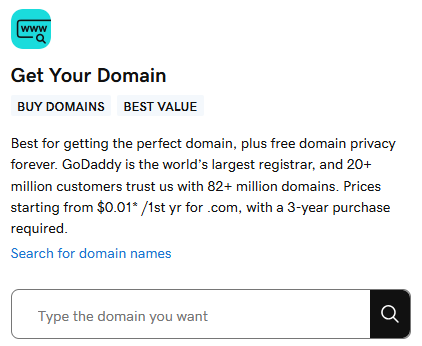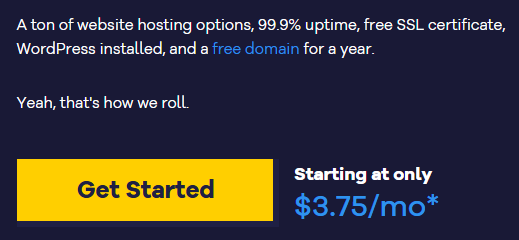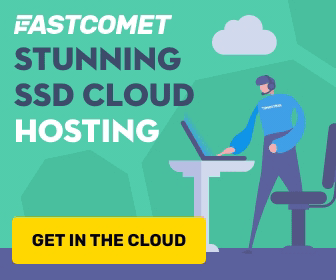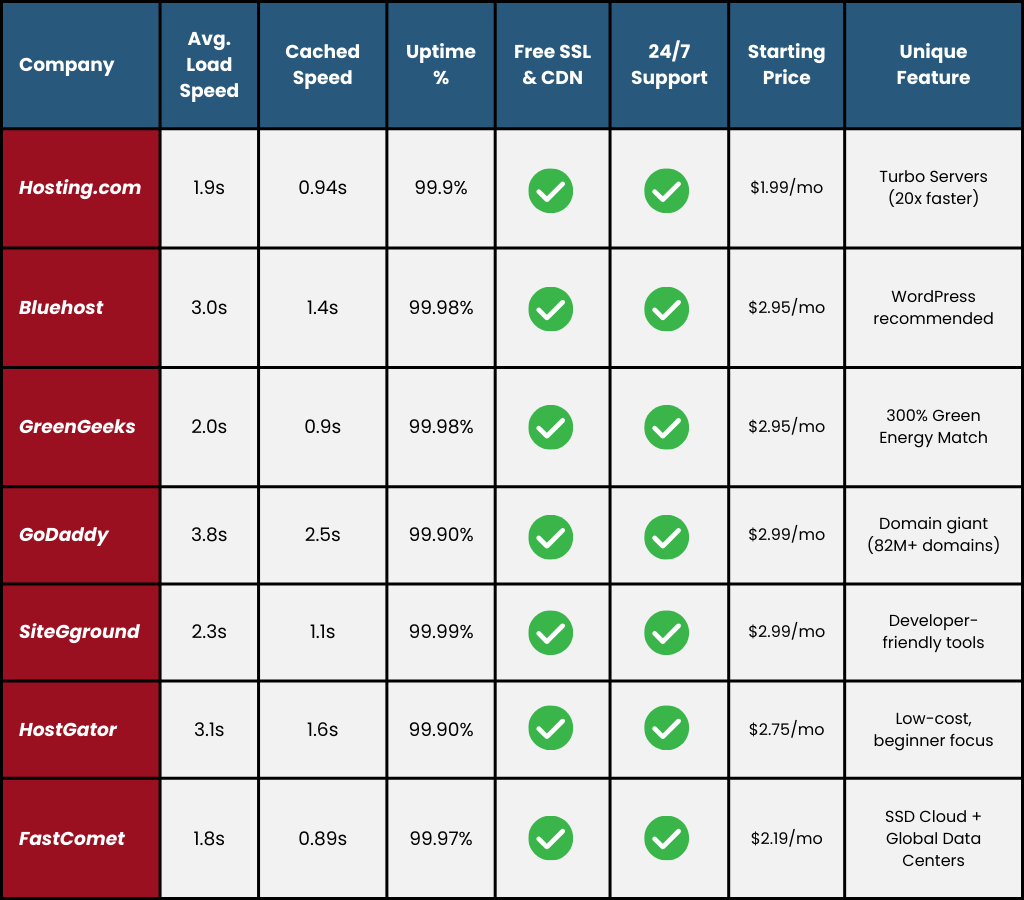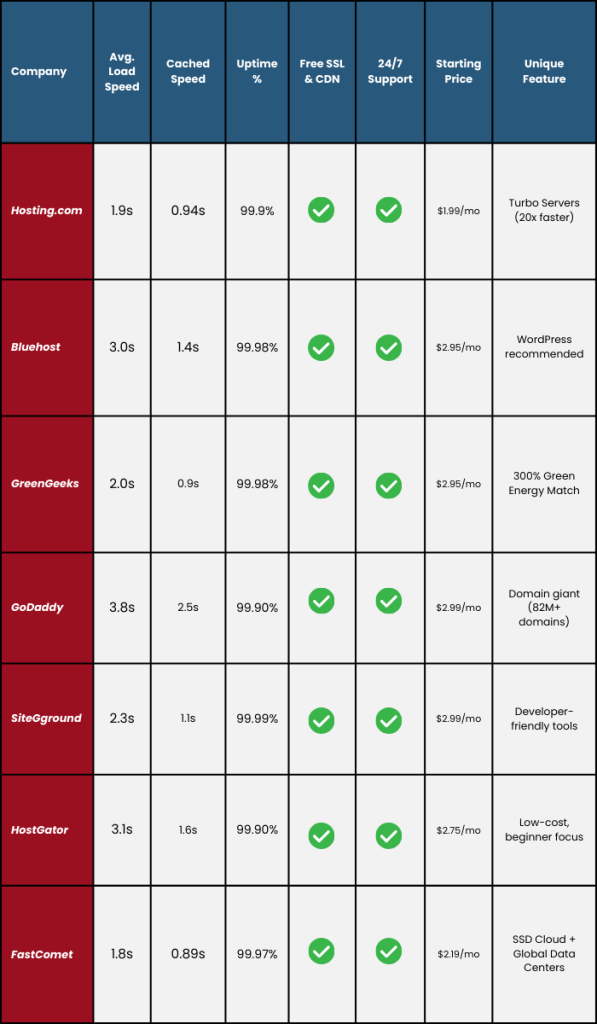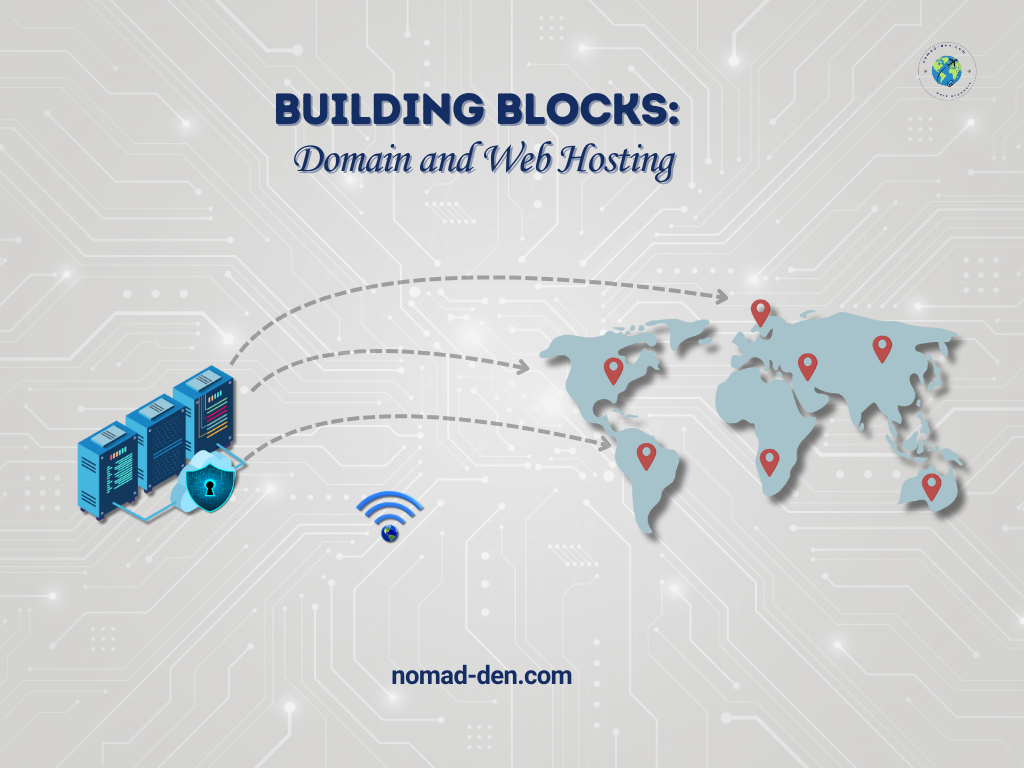
Affiliate Disclosure: This post contains affiliate links. If you click on these links and make a purchase, I may earn a commission at no additional cost to you. I only recommend products or services I genuinely believe in and that I believe will add value to my readers. Thank you for your support!
Hello and welcome back to my blog! If you’re new here, I’m excited to have you join us as we explore the essentials of choosing the best domain name and web hosting service for your website. Whether this is your first post or you’re a returning reader, you’ll find valuable insights to help build and enhance your online presence. If you’re wondering what web hosting is, it’s the service that makes your website accessible on the internet. Let’s dive in!
What is a Domain and Web Hosting?
Before we dive deeper, let’s break down a typical URL to understand its components:
- Protocol (http:// or https://):
- This part indicates the protocol used to communicate with the web server. ‘HTTP’ stands for Hypertext Transfer Protocol, where the ‘S’ stands for Secure and adds an extra layer of encryption for safer browsing. It’s highly recommended to secure your domain/website by using HTTPS, as it protects your users’ data and builds trust. This is the first part of a URL that tells your browser how to connect to the website.
- The Domain Name (e.g., www.yourwebsite.com):
- This is the most important part of the URL, and it’s what people will type into their browser to visit your site. The domain name consists of two main elements:
- The Middle Part (yourwebsite): This is the actual name of your website and should reflect your brand or the content of your site.
- The Extension (.com, .org, .net, etc.): Also known as the top-level domain (TLD), this part indicates the type of organization or purpose of the website.
- This is the most important part of the URL, and it’s what people will type into their browser to visit your site. The domain name consists of two main elements:
Key Domain Extensions to Consider
When choosing a domain name, the extension you select can impact how your website is perceived. Here are some of the most relevant options:
- .com The most popular and widely recognized extension. Ideal for businesses and individuals looking for credibility and a global audience. >> Most Recommended <<
- .org Commonly used by non-profits and community organizations, ‘.org’ lends a sense of purpose and trust.
- .net A solid alternative to ‘.com,’ often chosen when the ‘.com’ version of a domain is unavailable.
- .mil Reserved for U.S. military entities, this extension is not available for public use but is important for military-related content.
- .cc A versatile, lesser-known option that’s often available when other extensions are not. Short and memorable.
- .edu Reserved for accredited educational institutions, signaling authority in the education sector.
- .gov Exclusively used by U.S. government entities, this extension signifies official government information. Note that this is for civilian government use, not military.
Learn more about top-level domains (TLDs) and other terms in our Glossary.
As you embark on your domain and web hosting journey, choose a domain that is easy to spell, memorable, and relevant to your brand. For example, if your niche is organic skincare, a domain like ‘speedyracers.com’ wouldn’t make sense and could confuse your audience. A well-chosen domain not only reflects your brand but can also boost your SEO by aligning with relevant keywords. Make sure your domain clearly conveys your niche and brand identity.
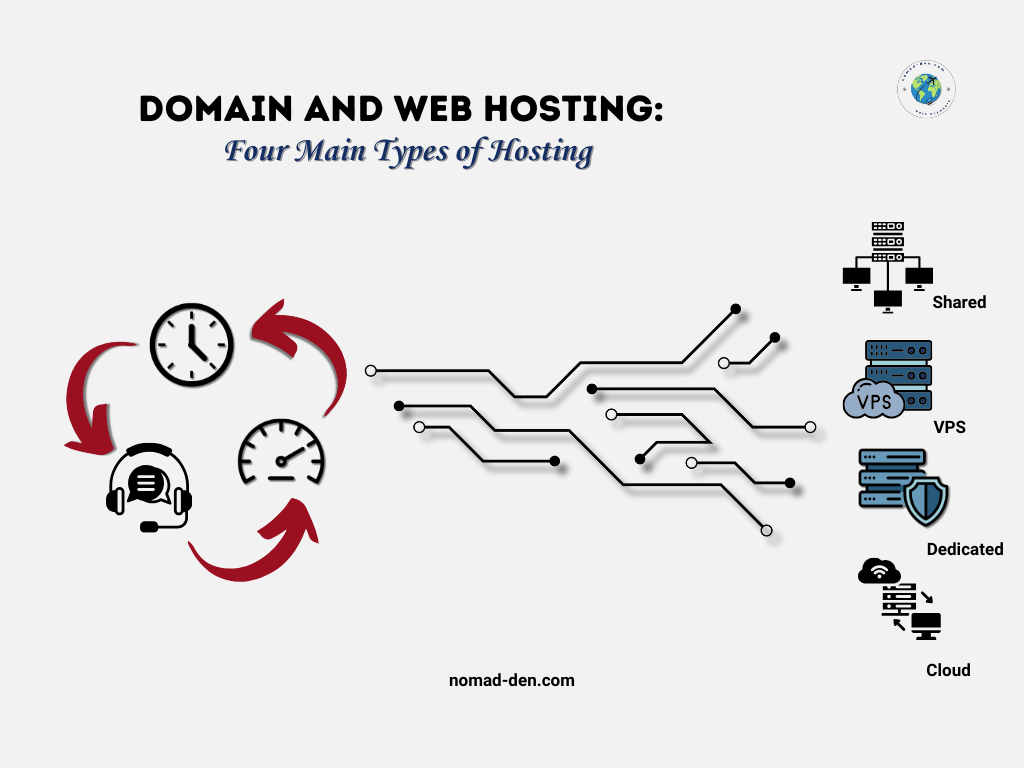
The Relationship Between Domain Names and Web Hosting
When creating a website, both the domain name and web hosting are essential components, each serving a distinct purpose.
- Domain Name: Think of the domain name as your website’s address on the internet. It’s what users type into their browsers to find your site, like ‘distantexist.com.’ Without a domain name, people wouldn’t have an easy way to locate your website.
- Web Hosting: Web hosting, on the other hand, is where your website’s files, images, and content are stored. It’s like the physical space that your website occupies on the internet. Without web hosting, your domain name would be an empty address with no content for visitors to see.
In essence, the domain name points to the web hosting, allowing users to access the website you’ve built. Both are essential for getting your site online and making it accessible to the world. That said, you can technically have a domain without hosting — such as when using a platform that provides built-in hosting. But hosting without a domain leaves you without an address for people to find you.
To learn more about building an online business without a website, check out my full post here.
Web Hosting Essentials
Reliable web hosting is crucial for your website’s performance and user experience. Here are some important points to consider:
- Uptime: High uptime ensures your website is always accessible. Look for hosts with 99.9% uptime or higher.
- Speed: Fast loading times improve user experience and search engine rankings. Choose a host that prioritizes speed.
- Customer Support: Responsive support is essential for resolving issues quickly and assisting with more technical challenges. Choose a hosting provider with strong customer service.
Types of Web Hosting
There are many different types of web hosting to cater to various needs and budgets. Here’s a breakdown of the most common options:
Shared Hosting:
The most affordable option, shared hosting means your website lives on the same server as many others. It’s beginner-friendly and cost-effective, but resources like bandwidth and memory are divided among users.
This can slow your site during traffic spikes, making it better for small blogs, personal sites, or early-stage businesses.
VPS Hosting (Virtual Private Server):
With VPS hosting, your site still shares a server but has dedicated portions of its resources. Think of it as an apartment in a larger building where you control your own unit.
This added stability and customization makes VPS ideal for growing businesses, e-commerce stores, or websites expecting moderate traffic.
Dedicated Hosting:
Dedicated hosting gives you full control of an entire server. It offers the best performance, security, and customization but comes at a higher cost.
This is best suited for large businesses, enterprise-level sites, or platforms handling high volumes of traffic and sensitive data.
Cloud Hosting:
Cloud hosting uses a network of servers that work together to keep your website online. If one server fails, another takes over — meaning greater uptime and scalability.
It’s a flexible choice for businesses of all sizes, especially those with fluctuating or unpredictable traffic.
Key Takeaways Before Choosing a Host
Choosing the right web hosting is a crucial step in building a successful website. By understanding the key factors like uptime, speed, and customer support, and selecting the hosting type that best suits your needs, you’re setting the stage for long-term success. With the right foundation in place, you’re now ready to explore some of the top web hosting services that can help you achieve your online goals.
| Hosting Type | Cost | Performance | Ideal For | Scalability |
| Shared | Low | Limited | Beginners, Blogs | Low |
| VPS | Medium | Balanced | SMBs, e-commerce | Moderate |
| Dedicated | High | Maximum | Enterprises, high-traffic | Limited (single server) |
| Cloud | Varies | Variable (Often high) | All businesses | High |
Top Web Hosting Recommendations
Truthfully, there are 1,000s of web hosting companies available around the world. These are some of the most-recognized and top providers for online businesses.
Hosting.com (formerly A2 Hosting)
Key Features:
- Turbo Servers for up to 20x faster page loads.
- Free site migration and SSL certificate.
- 24/7/365 Guru Crew support.
Why It’s Great:
- Hosting.com has rebranded with the goal of becoming the world’s most trusted hosting provider. They’re backing it up with global infrastructure investments, 100% carbon offset operations, and standout customer service. Known for speed, reliability, and flexibility, Hosting.com serves everyone from small startups to enterprise-level e-commerce.
Ready to level up your hosting? Discover Hosting.com today and see why thousands of businesses rely on them to keep their sites fast, secure, and always online.
Bluehost
Key Features:
- Longest-running recommended host by WordPress.org.
- Free CDN, SSL, and domain for the first year.
- Easy-to-use dashboard and one-click WordPress installs.
Why It’s Great:
- Bluehost has been a trusted name in web hosting for over 20 years, and still remains a popular choice for beginners. Backed by strong uptime (99.98%) and straightforward tools, it’s a solid option for anyone building their first WordPress site. While it doesn’t lead the pack on speed (3.0s average load), Bluehost makes up for it with simplicity, accessible pricing, and a long-standing reputation in the hosting world.
If you’re looking for a beginner-friendly host with WordPress’s official stamp of approval, Bluehost is worth considering for your first website.
GreenGeeks
Key Features:
- As a leading green web host, GreenGeeks offsets 300% of its energy usage with renewable energy credits.
- Free nightly backups and CDN integration.
- 24/7 expert support with advanced speed technologies
Why It’s Great:
- GreenGeeks stands out for its unique commitment to sustainability without cutting corners on performance. Alongside their environmental commitment, they deliver competitive speeds (2.0s average load, 0.9s cached) and a reputation for round-the-clock support that actually solves problems quickly. It’s a hosting solution where you don’t have to choose between doing right by the planet and getting the reliability your site needs.
Ready to go green with your hosting? Click below to explore GreenGeeks and see how eco-friendly energy, powerful performance, and dependable support all come together — at a competitive price.
GoDaddy
Key Features:
- Largest domain registrar with over 80 million domains managed.
- Free SSL certificate, CDN, and 24/7 support included.
- Easy domain + hosting integration for beginners.
Why It’s Great:
- GoDaddy is one of the most recognizable names in web hosting and domains, making it an easy first stop for new site owners. While it trails the leaders in speed (3.8s average load, 2.5s cached), its strength lies in simplicity and scale — plus an extensive marketplace of add-ons, from business email to site builders. For users who want everything managed in one place, GoDaddy remains a flexible choice.
For those who value convenience and one-stop service, GoDaddy remains a dependable option for getting your domain and hosting bundled together.
SiteGround
Key Features:
- Google Cloud infrastructure for reliability and global reach.
- Free CDN, SSL, and daily backups.
- 24/7 support with a reputation for solving issues fast.
Why It’s Great:
- Its developer-friendly tools and reliability make SiteGround a strong choice for website hosting for small business. Built on Google Cloud, it combines rock-solid infrastructure with strong speed optimization technologies. This is a hosting that delivers performance you can count on while giving you access to one of the most responsive support teams in the industry.
Discover why so many businesses trust SiteGround. Click below to explore plans that balance speed, support, and scalability — at a fair price point.
HostGator
Key Features:
- Free domain for the first year, plus SSL certificate included.
- One-click installs for WordPress and other apps.
- 24/7/365 support with live chat and phone options.
Why It’s Great:
- HostGator has been around for decades and built its reputation as a budget-friendly hosting provider. With strong uptime (99.9%) and affordable pricing, it’s a popular choice for small businesses and personal sites. While not the fastest option (3.1s average load, 1.6s cached), HostGator is known for budget plans that include features like unlimited website hosting, making it a common entry point for new site owners.
If you’re seeking a low-cost entry point into web hosting, HostGator provides steady performance and a full suite of beginner-friendly tools.
FastComet
Key Features:
- SSD-only cloud with global data centers for faster loading times.
- Free daily and weekly backups.
- 24/7 customer support with real-time chat.
Why It’s Great:
- With one of the quickest cached speeds in this list, FastComet ranks among the fastest web hosting providers available today.. It’s a reliable option for site owners who need worldwide accessibility paired with strong security measures. Add responsive support into the mix, and FastComet offers a balanced package of speed, safety, and service.
Need a hosting solution that’s fast, secure, and globally accessible? Click on the banner below to learn how FastComet’s worldwide data centers and cloud technology can keep your site performing at its best — all at a competitive price.
Pricing is one of the biggest factors when choosing a host. The website hosting cost can range from just a few dollars to premium rates depending on speed, uptime, and support.
Conclusion
Choosing the right domain and web hosting service is a critical step in building a successful online presence. Your domain name is your digital identity, and your web hosting is the foundation that supports your website’s performance, security, and growth.
By understanding the essentials and exploring the different types of hosting available, you can make an informed decision that aligns with your goals. Whether you’re searching for the best hosting for small business, need a provider with sustainable practices, or want the fastest global performance, the companies recommended in this post offer a range of reliable options to meet your needs.
FAQs
Q: What’s the difference between a domain name and web hosting?
A domain name is your website’s address, like www.example.com, while web hosting is the service that stores your website’s files and makes them accessible on the internet.
Q: How do I choose the best domain name for my website?
Choose a domain name that is easy to remember, reflects your brand, and includes relevant keywords. It should be short, avoid numbers and hyphens, and ideally, have a .com extension.
Q: Can I change my web hosting provider later?
Yes, you can change your hosting provider. Many providers offer migration services to help you transfer your website smoothly.
Q: How important is website speed for SEO?
Website speed is crucial for SEO. Search engines like Google prioritize fast-loading websites in their rankings, and users are more likely to stay on and revisit a site that loads quickly.
Continue Reading Related Posts
- Why Hosting Speed Matters – Learn why faster load times aren’t just a luxury — they directly affect SEO, user experience, and conversion rates.
- Best Tools for Online Privacy and Security – Protect your site and data with practical tools designed to keep hackers and scams at bay.
- Essential Tech Tasks Made Easy – Overwhelmed by the tech side of running a site? This guide breaks down the tools and terms so you can focus on growth.








